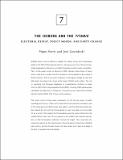| dc.contributor.author | Lovenduski, Joni | |
| dc.contributor.author | Norris, Pippa | |
| dc.date.accessioned | 2010-06-17T02:36:47Z | |
| dc.date.available | 2010-06-17T02:36:47Z | |
| dc.date.issued | 2003-01-01 | |
| dc.identifier.uri | http://hdl.handle.net/1721.1/55922 | |
| dc.description.abstract | Multiple factors can be offered to explain the Labour victory and Conservative defeat in the 2001 British general election. Here we pursue one of the most interesting explanations offered by a modified Downsian model of party competition. Part I of this paper builds on Stimson’s (1991) rational choice theory of policy mood cycles and considers how this framework can be applied to the context of British elections. Part II discusses measures of ideological change at mass and elite levels, focusing on two issues at the heart of British party politics: Tax cuts vs. spending, and European integration vs. independence. Evidence is drawn from the 2001 British Representation Study (BRS), involving 1000 parliamentary candidates and Members of Parliament. Comparisons are made with the British Election Studies (BES). Part III lays out the evidence. This study comes to three main conclusions: (1) On the key issues of public spending and Europe, Labour and Liberal Democrat politicians remained close to the center-ground of Westminster party politics, with the Nationalist parties farther towards the left, and the Conservatives in clear blue water on the far right; (2) as a result of this pattern the Conservatives were the party furthest from the median British voter; and (3) one reason for this pattern was selective perception, so that Conservative politicians "missed the target." The conclusion discusses the reasons for this phenomenon, the implications for the future of British party politics, and the broader lessons for why parties fail to learn and adapt in the face of repeated electoral defeats. | en_US |
| dc.language.iso | en_US | en_US |
| dc.publisher | Center for Public Leadership | en_US |
| dc.relation.ispartofseries | Center for Public Leadership Working Paper Series;03-07 | |
| dc.rights | Attribution-Noncommercial-No Derivative Works 3.0 United States | en |
| dc.rights.uri | http://creativecommons.org/licenses/by-nc-nd/3.0/us/ | en |
| dc.subject | party affiliation | en_US |
| dc.subject | policy | en_US |
| dc.subject | electorate | en_US |
| dc.subject | leadership | en_US |
| dc.subject | kennedy school | en_US |
| dc.subject | hks | en_US |
| dc.subject | cpl | en_US |
| dc.title | The Iceberg and the Titanic: Electoral Defeat, Policy Moods, and Party Change | en_US |
| dc.type | Working Paper | en_US |
